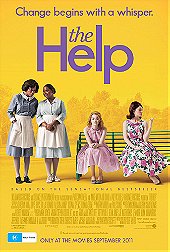The Help offers only a soothed-over, glossy portraiture of racial relations during the Civil Rights era. It plays it safe, only hinting a true darkness or briefly showing a scene of great violence or fear before rebounding back to featherweight fluff. It’s not that the history is revisionist; it’s that the story seems to have instead put a filter on itself. Any true depth the characters are given can be placed squarely on the fine performances from three standouts, and otherwise every plays things incredibly broadly. Bryce Dallas Howard’s racist alpha-bitch group-leader does everything but twirl a moustache in her heinous plotting. It’s this kind of simple reading of good/bad that hinders The Help at every turn.
You see, The Help makes the egregious error of mistaking Skeeter, a character who is clearly just a siphon for the voiceless black maids to tell their stories, as a person of interest and a heroine we can rally around. Either as written or performed by Emma Stone, who has yet to leave a lasting impression upon me, Skeeter is a dull character. She’s tenacious, career-minded, socially-progressive – in short, everything that is needed to be a catalyst for the story. There’s no hint of the racial bile that has been surrounding her all of her life as having even impacted her in the slightest. It’s like she came fully-formed out of the foam of liberal white-guilt in the post-Civil Rights era.
The true leads, when we’re given enough opportunity to spend time with them and their complicated interior lives, are Aibileen (Davis) and Minny (Octavia Spencer). They both always thought that this would be their burden, their lot in life. They never thought that they had any other options, or that any other options were even the slightest bit possible. Their mothers were maids, and their grandmothers were slaves. They endure because they have to.
Now, whether their characters are allowed to be so complex and fully-realized is a matter of debate between the written word and what they’ve brought to the roles. I lean towards the latter since so many of the others are underdeveloped or, oddly, played up for comedy. Spencer does portray the more quick-witted and stubborn of the two, but when it comes to nailing quiet dramatic moments she more than holds her own. One wishes though that her character’s dénouement played out a little bit better. And her scenes with Jessica Chastain, as her employer, are wonderful for their chemistry together. Chastain’s character starts off as some kind of poor white-trash bleached-blonde bimbo before texture and shading is added in. Chastain’s is the third performance that I mentioned earlier as a standout.
If The Help had focused exclusively on the characters portrayed by Spencer, Davis, and Chastain, and had focused upon issues of race, class, interior racism/classism/sexism, we might have had a far superior film. Scenes with Skeeter’s cancer striken mother are oddly played for laughs, and a relationship with Chris Lowell, who as attractive as he is does nothing in the movie, goes nowhere slowly. Again, the filmmaker’s mistook Skeeter for an interesting character, but perhaps this is a problem with the source material?
Anyway, and now we finally get to Viola Davis. When Meryl Streep won the Best Actress SAG Award in 2009 for Doubt, she rapturously proclaimed that co-star Viola Davis was a brilliant actress and demanded that someone needed to give her a movie to showcase her talents. (Watch it here: youtu.be/ByqzzussjkU?t=5m13s) Now that someone has, I have one modest request: Someone gives her a better one.
Davis’ performance is a rare thing of beauty. In her posture and mannerisms we can see the aching of her joints, the rust that is starting to form around them from such taxing labor. In her face we can see so much. When she peers into the camera to talk about the death of her son the guttural impact of her facial muscle’s minute changes cannot properly be described. Or the sheer panic that sets in when a bus ride home one evening is stopped and she is forced to flee – for her life, for her safety, for everything.
It is in these moments with Viola Davis that The Help transcends its meager Lifetime/Hallmark movie-of-the-week vibe. The unearned faux-happy ending only compounds the problem. So why then did I give it a 3.5 out of 5? Well, across the board it is well-acted; even what the actresses are asked to do is broad comedy for some odd reason. It’s very well made, one cannot argue that a lot of time and money went into the costumes, hair, makeup, sets. But the biggest reason is that so few movies like The Help are made nowadays. I wanted to throw as much support behind a movie that: 1) stars minorities in the lead roles, 2) came out in the summer and didn’t shy away from telling an actual story, and 3) it’s disgusting how underrepresented/underutilized black actresses are in roles of some kind of depth and characterization. For those reasons, one should see The Help, no matter how problematic and rose-colored it is.
 Login
Login